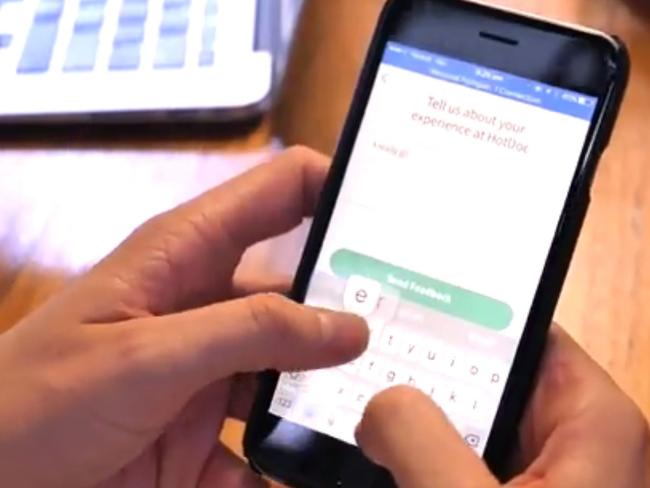The jobs app that could kill the job interview
HATE job interviews? A new recruitment method is eliminating the need for the awkward meetings and cutting out CVs.
At Work
Don't miss out on the headlines from At Work. Followed categories will be added to My News.
GREAT news, sweaty-palmed, jittery job seekers: A new way of recruiting is seeing employers scrap job interviews in favour of solid proof of skills.
Let’s face it, no one likes a job interview — neither a candidate or a potential boss.
There’s the excruciating smalltalk and constant judgment, the moments you both have to pretend you’re not wasting each others time, and the exhausting masquerade you have to keep up to give a good, professional, one-off impression.
The worst part is, no matter what side you’re on, chances are you’ll go through dozens of these farcical sit-down sessions before achieving the result you want.
Now, there’s a new trend in hiring that’s seeing bosses scrap the process altogether and have staff selected for purely for their relevant skills rather than how they perform in an interview.
Melbourne start-up Weploy is bringing Tinder-style online skills-matching to the Australian job market, and cutting out the need for annoying interviews and CV exchanges in the process.
When candidates sign up to the service, they fill Weploy in on their qualifications and background, go through psychometric and cognitive tests to determine their skills, and have just one, quick interview with the agency before they’re matched with employers.

If a candidate (or “Weployee”) matches the employer’s needs, they’re automatically offered the job, with no further selection involved on the employer’s behalf.
The business argues it not only makes the process easier for both parties, but it removes all unconscious bias and discrimination that can come with recruitment.
It works on the basis that no matter what your gender, age or background, as long as you have the skills, you get the job.
Engineering student Ella had sat through a number of job interviews for positions that just weren’t quite right before signing up to the service.
While she’s confident she consistently made a good impression, there was always something about her experience or availability that didn’t quite suit the going position.
Since she signed up to the app-based service, she said, all the work is done for her.
She said even though the process when she joined the platform was thorough, it was a lot easier than sitting through all the interviews she would have had to go through to secure the many contract jobs she’s had since joining the platform.

“It was a matter of going through a screening process, psych tests, a problem-solving test and a quick interview, then I had my first job in about four days,” she said.
“It’s quite a rigorous process to get on the platform, but after that all the work is done for you and for the client. It gauges what jobs you’re suited for and it matches you to the culture too.”
Ella says some of her fellow students are excited by the idea of getting work through what’s being called “Uber for jobs”, but some are hesitant as well.
The start-up is still in its early stages and mainly supplies to the gig economy.
It’s also made its first big tech hire poaching one of Silicon Valleys’ top recruiters, Marissa Senzaki, from Slack and previously Facebook, Google and Skype, as the company’s head of talent acquisition and Weploy experience.
She says Weploy is “breaking down some of the current barriers” in employment.
“The future of work is one that will allow the employee to take more control over their career development and environment. It is less about certifications listed on a CV and more about your experiences and credibility through your network,” she said.
“We all have a digital footprint. We can look up reviews for employers online, as well as create our own online profiles with recommendations and portfolios of our work. More transparency allows us to be honest about what we can offer and what we want.
“With more people choosing the gig economy over a traditional job, people are finding more freedom to make their job work for them, and not the other way around.”

But not everyone thinks it’s a great idea.
Professor of career education and development at Australian Catholic University Jim Bright said there were many situations were both an employer and employee would benefit from a face-to-face meeting before committing to starting a job.
Dr Bright said there was also potential for the agency to simply replace employers’ potential bias with their own.
“The temptation to replace interviews with testing etc has always been there, but in many cases both employers and candidates will still insist a meeting should form part of the decision making process,” he said.
“There are a lot of circumstances where employers will insist on seeing candidates because they know their workplace better than anyone else.”
Dr Bright said matching candidates’ skills to a position would only work if the criteria for the job are fully specified and accurate.
“And they rarely are,” he said.
“If that’s the case, the idea of candidates applying essentially blind and having to take the word of the middle man may not work out.”
The careers expert conceded that unconscious bias was a genuine issue when it came to recruitment, but said the issue was sometimes “overstated”.
Originally published as The jobs app that could kill the job interview



